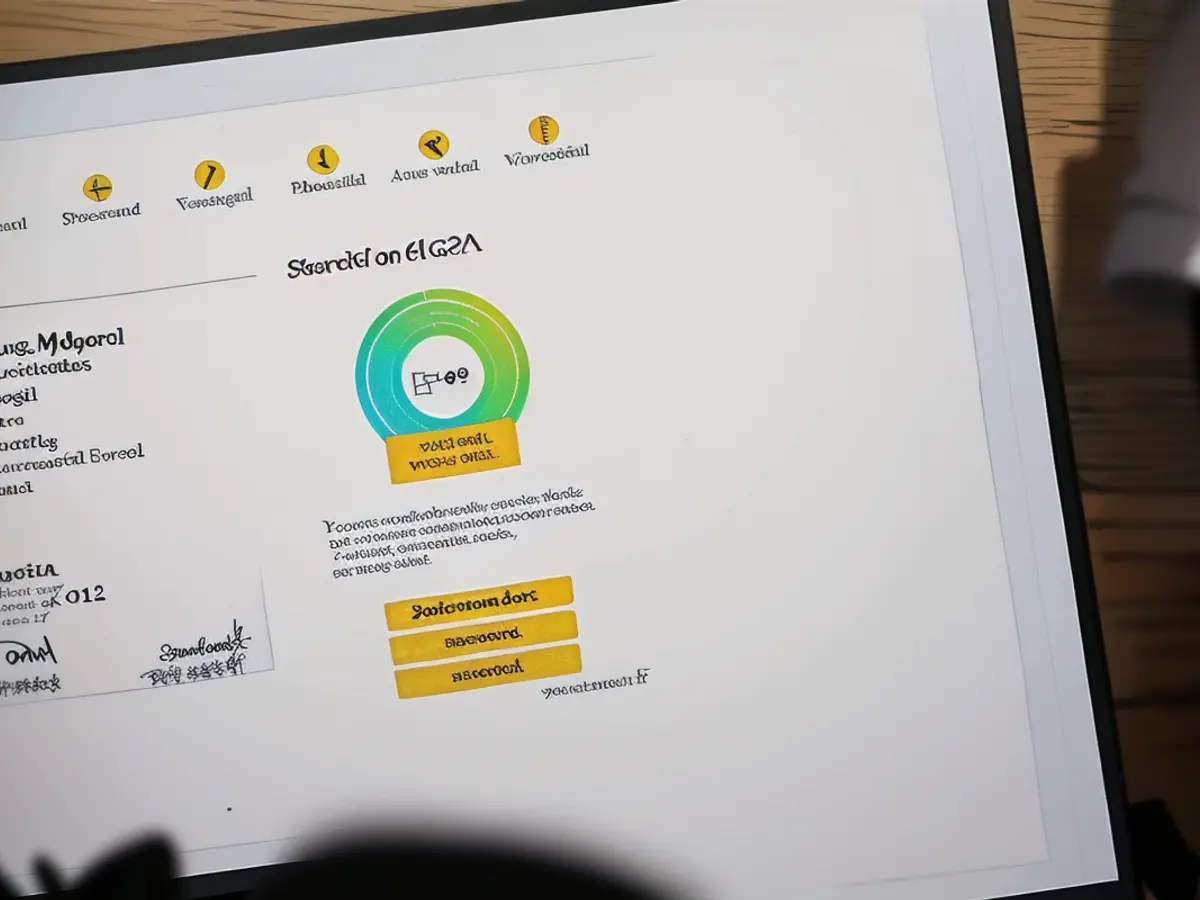Rejected credit application? Ways to boost your Schufa rating.
If people's trustworthiness is called into question by credit agencies, they face greater challenges. This assessment is crucial for finalizing many deals. However, consumers can exert some control over the situation.
What's the probability that a client will fulfill their financial obligations exceptionally well? Banks and organizations frequently inquire about this information before extending a deal to consumers. Credit institutions like SCHUFA help them with this evaluation. This measures a person's reliability in making payments as a percentage and assigns them to one of five score classes.
They are - from least to greatest - "Inadequate" (up to 29.99%), "Reasonable" (up to 85.88%), "Adequate" (up to 93.53%), "Good" (up to 97.21%), and "Excellent" (97.22% and higher). According to SCHUFA, approximately three-quarters of the individuals in their databases belong to the top rating group.
The SCHUFA can indicate to stored individuals their particular classification. However, it's challenging for outsiders to fully understand the mysterious process behind determining scores. In an interview, Stephanie Pallasch from Stiftung Warentest explained the often cryptic scoring process for customers.
Is there a minimum score required to demonstrate good financial standing?
Stephanie Pallasch: First, it's essential to comprehend that SCHUFA isn't the only credit agency. However, it does have the largest database, so it wields a lot of influence in people's daily lives.
Truth be told, SCHUFA scoring alone frequently serves as a foundation for a company's decision. Potential partners like banks and landlords may only use SCHUFA scores as one source among many. How they deal with the scores depends on the company.
SCHUFA not only determines the score but decides who they'll collaborate with - meaning whether they'll just accept an "Excellent" or also a "Good" score. Believe it or not, especially a less-than-stellar SCHUFA score might only deteriorate the terms of a contract.
It's crucial to remember that banks often possess vastly more information than SCHUFA. They know about money and assets, whether people rent or own homes. SCHUFA doesn't have insight into this information. Nevertheless, it's true that a poor SCHUFA score makes concluding certain contracts more difficult.
How late is the ideal time to think about my score?
There's no need for a perfect score. If your life has been going smoothly, odds are your score is fine. However, if things change and your score is no longer desirable, that's when you should check your information on SCHUFA. This could happen if credit card applications are rejected or if you suddenly can't make purchases on account.
What can I do to boost my credit rating?
To grasp how scoring works, you can use SCHUFA's score simulator. Just remember that you need to avoid having negative SCHUFA ratings, such as unpaid bills. Additionally, your data should always be up to date. If you've ever paid off a debt, resolved a dispute, or closed an account, the corresponding details should no longer appear in SCHUFA.
Moreover, it's advisable to limit the number of current accounts and credit cards you have. Having one or two still makes a positive impact, but more can create a negative impression. You might even think about cancelling unnecessary accounts and credit cards. Interestingly, the longer a business relationship lasts, the more it benefits your score.
It helps to review the aforementioned details. Nonetheless, you can't actively manipulate your score. After all, it's intended to accurately assess consumers' payment habits. If the situation changes, the score loses its purpose.
Read also:
- This will change in December
- Dikes withstand water masses so far - Scholz holds out the prospect of help
- Fireworks and parties ring in 2024 - turn of the year overshadowed by conflicts
- Attacks on ships in the Red Sea: shipping companies avoid important trade route
- If you're facing issues with a credit application due to concerns about your creditworthiness, the Federal Court of Justice can provide guidance on related legal issues.
- Consumers can review their Schufa ratings and understand the scoring process better by utilizing the advisory services offered by consumer centers, which are often affiliated with the Federation of German Consumer Organizations.
- Judgments from the European Court of Justice, such as the GDPR, have had a significant impact on how credit institutions, including Schufa, handle personal data and consumer protection concerns.
- Banks may rely on Schufa scores as a primary factor in deciding on a consumer's eligibility for a personal loan, but they also consider other factors, like personal income and assets, before making a final decision.
- As an advisor, Schufa provides information to consumers about the collaboration between credit agencies and lenders, enabling individuals to better understand the role of their credit scores in applications for loans and other contracts.
- In the event of a rejected loan application, consumers can collaborate with Schufa's customer support to correct any potential errors or misrepresentations in their Schufa records, thereby improving their creditworthiness and chances of securing future credit.
Source: www.ntv.de







